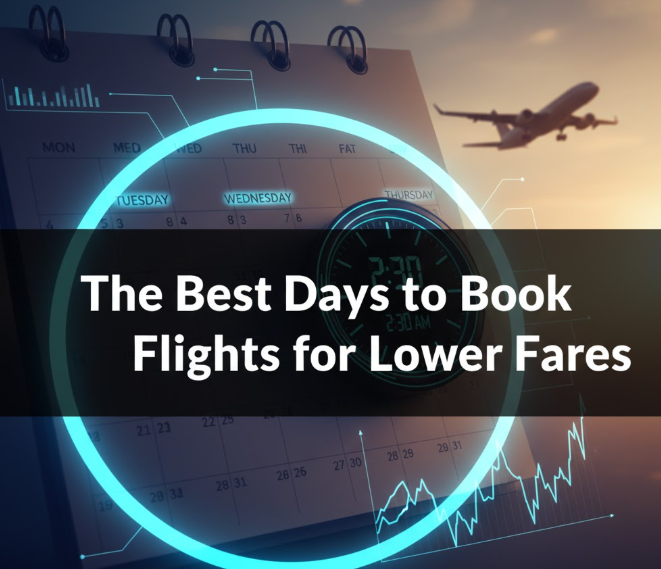Your wallet doesn’t have to take the hit for your travels. Whether you’re weekend tripping or planning the excursion of a lifetime halfway around the world, adjusting modes of travel to save on flights is a possibility when you’re armed with the right information. Airfare is often the largest non-prepay expense for travelers, but smart planning in advance and a bit of flexibility can give you more options at better prices so you can spend your money while enjoying your vacation rather than getting to or from it. This ultimate guide gives you the tools that frequent travelers and budget adventurers use to save hundreds of dollars on every trip.
The Perfect Timing Strategy
When to Book Your Tickets
When it comes to cheap flights, timing is not just everything — it’s the only thing. Airlines operate complex algorithms that continually reset prices depending on demand and competition as the time to the flight dwindles. Research suggests booking your flight at the optimum time can save you 20% to 40% compared to median and last-minute purchases.
For flights within your country, buy 1 to 3 months in advance. Prices frequently fall on Tuesday afternoons and Wednesday mornings as new fare deals launch, and more seats are made available at the lowest fare levels. They generally must be booked further in advance if you are considering an international flight; the best prices for these flights are found 2 to 8 months in advance.
Average Savings by Booking Time
| Booking Window | Average Savings |
|---|---|
| 1 Week | 15% |
| 1 Month | 35% |
| 2 Months | 45% |
| 3 Months | 40% |
| 6 Months | 25% |
Best Days to Fly
The prices you pay for your flights can change a lot depending on when and even the time of day that you leave and return. Airlines are privy to the fact that most travelers would rather avoid flying on Fridays and returning home Sunday, a process that cuts into their precious weekends. And high demand is pushing up prices. Fly on a Tuesday, Wednesday or Saturday when all those businessmen stay home and there are fewer leisure travelers.
So-called red-eye flights and early-morning departures are often far cheaper simply because fewer people want to wake up at 4 a.m. or bound into town exhausted at midnight. Provided you can put up with the inconvenience, these unpopular hours can cut your airfare expense dramatically.
Smart Search Techniques That Work
Clear Your Browser Cookies
Airlines and booking websites use cookies to keep a record of the searches you make. And when they see you making the same search multiple times, some may be motivated to push up prices, since they know you’re being indecisive. This is a mental trick designed to encourage you to book early by making you afraid that the prices will just keep going up. Best way to defeat this is search in incognito or private mode, or be clearing your cookies and cache frequently.
Compare Multiple Booking Platforms
And never take the first price you’re offered. Booking websites have relationships with different airlines, so they can display varying prices for the same flight. Try to employ meta-search engines that comb multiple sites at once, but always guide your browser to the airline’s own site as well. Occasionally, you might save when booking directly, perhaps because of fees or special deals.
For more travel tips and flight booking strategies, visit Call to Flights.
| Search Strategy | How It Saves Money | Potential Savings |
|---|---|---|
| Flexible Date Search | Displays prices on different dates | $50-$200 per ticket |
| Nearby Airport Search | Features smaller airports | $30-$150 per ticket |
| One-Way vs Round-Trip | Combo to mix airlines for savings | $20-$100 per ticket |
| Multi-City Routing | Creative connections lower rate | $40-$180 per ticket |
| Error Fare Alerts | Catch big pricing mistakes by airlines | $200-$800 per ticket |
Be Flexible With Your Destination
If you’re not wedded to a particular destination, use search engines that show you the cheapest flights from your airport. This “everywhere” search feature unveils unexpected deals to destinations you may not have considered. You might find that Portugal is cheaper to fly to than Florida, or that Thailand costs less than California.

Powerful Tools and Resources
Price Alert Systems
Configure alerts for your favorite routes so you know right away when prices fall. These automatic alerts track airfare 24/7, so you don’t have to constantly be rechecking prices. When a major price drop happens on something you want, you get an email or app notification to be the first one to know.
Pro Tip: Watch prices for three weeks before booking. That provides you with a clear sense of whether the current prices are truly good deals or if you should sit and wait until rates improve.
Airline Miles and Credit Card Points
When employed strategically, loyalty programs and travel credit cards can provide tremendous value. Sign-up bonuses alone can, in some cases, cover an entire round-trip flight. And if you’re not a big traveler, just using a travel rewards card for your everyday spending can net you points more quickly than you’d think.
Keep an eye out for promotions that airlines are running where you can earn bonus miles on certain routes or during a certain booking period. Some cards also offer annual travel credits, as well as free checked bags and priority boarding (all of which will effectively limit the total amount you pay to travel, even if ticket prices seem identical).
Alternative Booking Methods
Consider Budget Airlines
Budget airlines have transformed air travel, stripping it back to basic transportation at rock-bottom prices. Though you won’t have free meals, entertainment systems or the most generous luggage allowances, the base fare is often 50% to 70% cheaper than on traditional airlines. Budget airlines make too much sense for shorter flights where you don’t need frills.
Carefully read the fine print, however. Low-cost carriers make a profit with added fees for checked baggage, seat selection, printing boarding passes at the airport, and onboard refreshments. Add in extra essentials when you’re on a budget airline and the fare may not be such a deal anymore.
Book Separate Legs
In some cases, buying two one-way flights is cheaper than purchasing a round-trip ticket. This also allows you to combine different airlines, selecting the cheapest one for each leg of the trip. You could fly one way on one carrier and the other on another, maximizing your savings.
Same thing with connections. Sometimes the combined cost when you book a flight to a major hub city and then book separate onward travel to your final destination is less than the cost of a single through-ticket. This takes some timing to get right to have a decent layover, but it can be a lot of money saved.
Look Into Nearby Airports
Big cities usually have more than one airport. Narrow down your search to the close ones, and don’t limit yourself to the closest one — all airports nearby are fair game! Smaller secondary airports can be vastly cheaper to fly into, and you’ll more than make up the difference in ground transportation cost to your actual destination.
So when visiting any given city, research prices to Heathrow, Gatwick, Stansted, Luton and London City airports if you’re going to London — then do that for other ones too. Look at New York, compare JFK, LaGuardia and Newark. The discrepancies between these airports for the same dates are staggering.
Learn more about finding cheap flights with additional expert strategies.
Seasonal Considerations
Travel During Off-Peak Periods
Airlines use seasonal factors to set prices. Shoulder seasons, the periods before and after peak tourist times, offer the best of both worlds: great weather, often with prices that are much easier to swallow. Europe is cheapest in late fall and early spring, Caribbean destinations are a deal in late spring and early fall, and Asia has deals when it’s monsoon season.
Stay away from big holidays when other people are also trying to travel. Prices skyrocket around Easter, Spring break and Memorial day as well as summer vacation. If you’re able, traveling a few days earlier or later than the peak time can halve your costs.
| Destination Type | Peak Season | Best Value Season |
|---|---|---|
| European Cities | June-August | November-March, not including holidays |
| Caribbean Islands | December-April | May-November |
| Southeast Asia | December-February | May-September |
| Australia/New Zealand | December-February | May-August |
Hidden Tricks From Frequent Flyers
The 24-Hour Rule
Airlines with flights coming to or from the United States are generally required to offer free cancellation within 24 hours of booking. This is a policy that allows you to lock in at a price but still looks around for better deals. If you find something less expensive the next day, there’s nothing to keep you from canceling your original reservation at no loss and picking up that lower fare.
Student and Youth Discounts
Tip: If you’re a student or under 26, there are specialized booking platforms that offer exclusive discounts. (They aren’t publicized on mainstream sites, but can take 10 to 30 percent off ticket prices.) They’ll require some sort of verification, but the savings are worth it.
Group Booking Considerations
If booking multiple tickets, make sure that the individual prices don’t add up to less than the group price. Airlines in some cases charge the priciest of available seats for all when booking a group of passengers together. Separate bookings may yield lower overall prices per person–that is, if some tickets are still available in a cheaper fare class.
Important: We recommend that you always check total prices including any taxes and fees before completing your booking. A base fare that seems like a bargain can end up ballooning under hidden charges, rendering it more costly than alternatives with upfront pricing.
What to Avoid
Booking Too Early or Too Late
Although advance booking also is typically cheaper, there can be a downside to purchasing tickets too far in advance. Airlines generally price flights high, and gradually reduce them as they seek to get a clear sense of demand. The process is reversed way too close to departure when prices rise as seats are filled. To strike the right balance, you’ll want to keep an eye on prices and learn the usual dynamics for your route.
Ignoring Local Airlines
Local carriers dominate on many international routes that don’t show up on Western booking sites. When you travel to Asia, South America or Africa, check out airlines which specialize in those regions. They often have fares that are competitive with some routes operated by major international carriers at which the latter levy a high revenue price to fly.
Falling for Fake Urgency
Booking sites apply pressure with countdown timers and messages that scream “only 2 seats left at this price.” Some scarcity is fair, but these are tactics that generally overplay before-the-deadline urgency. And rather than panic-buying something you’ll regret, make sure to spend the time comparing the options.
Your Journey to the Cheapest Airfare Starts Here
Scoring consistently low fares isn’t just luck by the draw—it’s strategy and can even be considered a science. By booking strategically, using a few helpful search tips, being flexible enough to alter your plans on the fly and even thinking critically about getting there in the first place, affordable air travel is absolutely possible.
Start implementing these methods today. Create price alerts for your dream destinations, clear your browser cookies before booking and look at travel dates outside peak times. The second round or the third week of arrangements and money saving tricks lends itself to being understood, taught and remembered. When you consistently find cheap flights, the world is your oyster.

Frequently Asked Questions
How far ahead should I book flights for the lowest fares?
For flights within the country, reserve 1-3 months in advance. For international travel, fly 2-8 months in advance of departure. The ideal sweet spot can differ according to season and route, so price watching helps make the call.
If I start my search over a few times, does it simply produce the same prices?
Yes, airlines and booking websites use cookies to follow your interest in certain destinations. Fares may go up after repeated searches to pressure you into booking. Always search in your incognito mode or clear your cookies to get the result without this price adjustment.
Are budget airlines really cheaper when all is said and done?
Budget carriers have lower base fares in exchange for extras like checked bags, seat selection and onboard refreshments. Do the math with all required add-ons before you make your choice. For brief flights with light baggage, they tend to still be the less costly option.
When is the best day of the week to book flights?
Airlines release new sales early in the week, which can cause airfare to become cheaper on Tuesday afternoons (since competing airlines will try to match prices quickly) and Wednesday mornings. Yet the best booking day isn’t as important as keeping an eye on fares and buying when it appears to be a good deal.
Will I get a refund if prices go down after I book?
For most airlines, price differences are not refundable, but you can cancel free of charge and rebook for the lower fare within 24 hours of booking (for American flights). Some credit cards and booking sites provide price protection — it’s worth checking.
Should I book directly with airlines or third-party sites?
Compare both options. There are a few third-party websites that sometimes have lower prices, but there’s nothing like booking directly with the carriers for great customer service and hassle-free changes. Always check the airline’s website, even if you find a deal somewhere else.
Just how much can flexible travel dates save you?
By changing your departure and return date by only 1-3 days, you can usually save $50-$200 per ticket. Flying during the week instead of at weekends or forgoing popular flight times can save you 20-40% compared to peak travel periods.
Are airline loyalty programs worth the effort?
Absolutely. Even infrequent fliers can gain something from the free-to-join loyalty programs. Miles add up from flights and credit card spending, eventually financing free tickets. Just with sign-up bonuses from travel credit cards, you can earn a free round-trip ticket.






